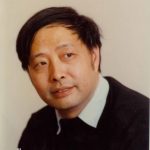 Born in 1953 in Hunan, Han Shaogong is one of the most prominent and innovative writers in China. While replying on traditional Chinese culture, in particular chinese mythology, folklore, Taoism and Buddism as source of inspiration, he also borrows freely from western literary techniques. He was once upon a time an enthusiastic Red Guard. Employed at a local cultural center after 1977, he soon won recognition as an outspoken new literary talent. His early stories attacked the ultraleftist degeration of China during the Mao era; they tended to slight “modernism.” Yet he reemerged in the mid-1980s as the leader of an avant-garde school of Serch for Roots.” Reader of Han’s fiction cannot fail to note that he has himself been influenced by Kafka and by the “magic realism” of Garcia Marquez. In 1987, the young author publishes a Chinese translation of Milan Kundera’s The Unbearable Lightness of Being. PRC writers have not been so polarized into modernist versus rural, provincialist “camps” as the Taiwanese writers. Partly to escape the death of economic and cultural opportunity in his native Hunan, he journeyed in 1988 to China’s underdeveloped and newly established tropical island province of Hainan, where he opened a journal called Hanan jishi wenxue (Hainan documentary literature). The magazine was very successful. He and other Chinese writers visited France in 1988, at the invitation of the French Ministry of Culture; Han was invited back in 1989 but was denided permission to leace China until 1991. Born in 1953 in Hunan, Han Shaogong is one of the most prominent and innovative writers in China. While replying on traditional Chinese culture, in particular chinese mythology, folklore, Taoism and Buddism as source of inspiration, he also borrows freely from western literary techniques. He was once upon a time an enthusiastic Red Guard. Employed at a local cultural center after 1977, he soon won recognition as an outspoken new literary talent. His early stories attacked the ultraleftist degeration of China during the Mao era; they tended to slight “modernism.” Yet he reemerged in the mid-1980s as the leader of an avant-garde school of Serch for Roots.” Reader of Han’s fiction cannot fail to note that he has himself been influenced by Kafka and by the “magic realism” of Garcia Marquez. In 1987, the young author publishes a Chinese translation of Milan Kundera’s The Unbearable Lightness of Being. PRC writers have not been so polarized into modernist versus rural, provincialist “camps” as the Taiwanese writers. Partly to escape the death of economic and cultural opportunity in his native Hunan, he journeyed in 1988 to China’s underdeveloped and newly established tropical island province of Hainan, where he opened a journal called Hanan jishi wenxue (Hainan documentary literature). The magazine was very successful. He and other Chinese writers visited France in 1988, at the invitation of the French Ministry of Culture; Han was invited back in 1989 but was denided permission to leace China until 1991. |